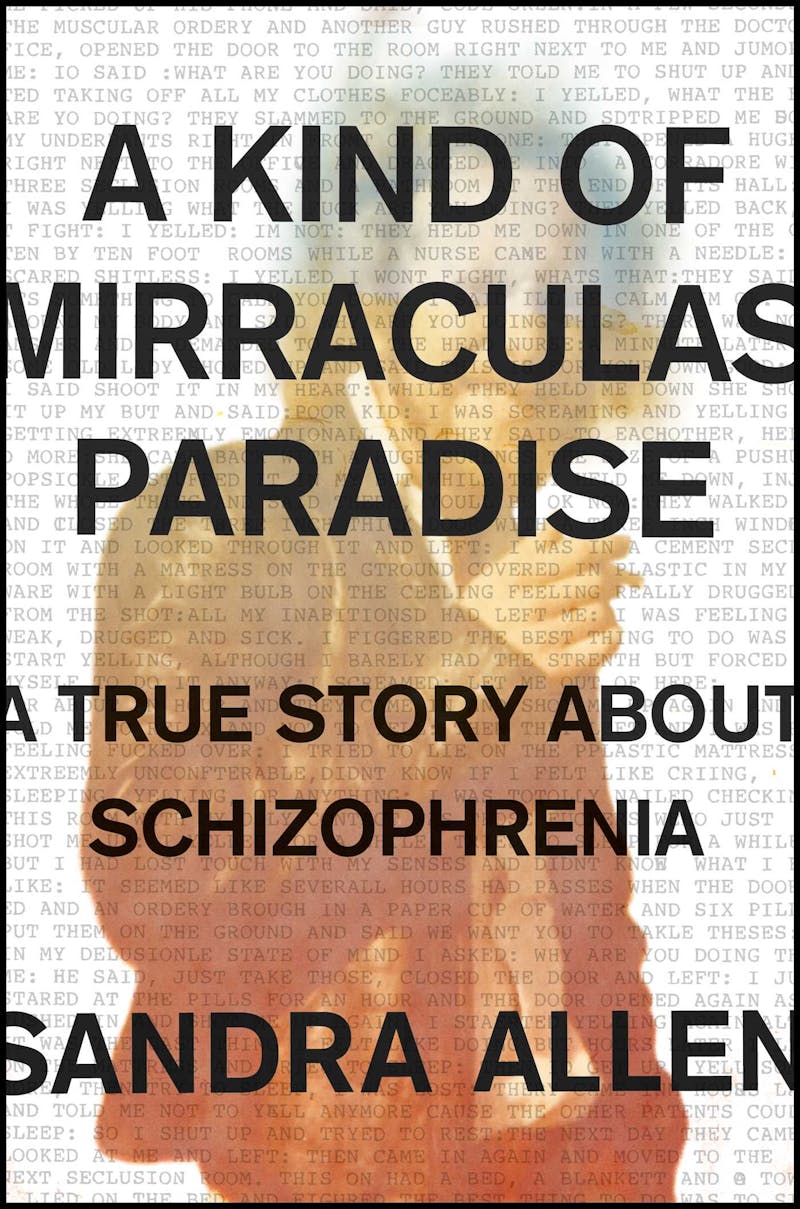The literature of madness takes many forms. For canonical writers of mental illness like Nabokov or Hesse, that illness is a way to expand the capacities of language to communicate the inner world. Narrating insanity lets Beckett, for example, open up his characters to the great chasms and paradoxes of existence that are difficult to describe with a normative voice. “In my head there are several windows, that I do know,” his protagonist meditates in Molloy, “but perhaps it is always the same one, open variously on the parading universe.”
There are also traditions of writing about mental illness outside fiction. There is the great and varying corpus of medical writing, of course, which in psychiatry interestingly extends to include the quite literary prose of Freud, Lacan, Adler, Klein, and so on. Because the mind is something we all have, writing about it has always appealed to a wider field than the medical profession per se. This disciplinary cross-pollination means that textbooks on clinical practice and the most outlandish psychoanalytic literary criticism—like, say, the professor I once had who insisted that you could tell how important Walter Pater was to Virginia Woolf because Virginia Woolf never once wrote about Walter Pater—are sisters.
In A Kind of Mirraculas Paradise: A True Story about Schizophrenia, Sandra Allen marries several distinct genres to produce an insight into what it means to be a person with a psychiatric diagnosis—as opposed to a novelist toying with the boundaries of thought. That real person is Allen’s uncle Bob, a person who was present at family vacations and at the boundary of Allen’s life but not really their closest relation. (Allen uses the pronouns she or them.) When a child, Allen’s mother had told them that Bob was “crazy,” but without further detail.
When Allen went to study writing in Iowa, Bob mailed them a manuscript. Over the phone, he’d already given a hint: “‘Hey, I wrote a book, man. I wrote the story of my life.’” That story turned out to be a typewritten manuscript, almost entirely in capitals, and reeking of cigarette smoke. It was riddled with spelling errors, iffy versions of contested events, queasy accounts of sleeping with a 16-year-old, and much of what Allen rightly calls “overt racism.” Bob seemed to expect Allen to do something with it, but at first they resisted the enjoinder, and put it in a drawer. Eventually, however, Allen was drawn into Bob’s account of his life by the surprising quality of its language.

The book is composed of two interwoven sections, in different fonts. In an “interstitial” meditation on Bob’s text, Allen tells the story of the mailed manuscript, reflects on Bob’s diagnosis of schizophrenia. They factcheck his memoir, contacting or attempting to contact every family member and psychiatric facility friend and childhood playmate. In this section, too, they write about the changing ways that American psychiatry has categorized, institutionalized, and treated madness.
Then, in another font, we get Bob’s life story. Allen has “translated” the manuscript into something readable, a “cover” version in their words. Told in the third person, but using Bob’s writing as the source, Allen describes the life of a man who is institutionalized during adolescence at an execrable facility for problems with “reality,” then wavers on and off medication while pursuing his desires and fleeing his fears in hippie-ish California. All-caps and spelling mistakes are preserved at some points (“Later, at the dorm, he made THRETENING BODY SIGNALLS TO A COUPLE KIDS IN MY DO RM LIKE ID KILL THEM WITH MY KNIOFE”).
Every page of Bob’s account is thrilling writing. One Bay Area night Bob and a friend roamed through town. “Up and down Broadway the clubs’ marquees seized and shone and big dudes stood out front moving velvet ropes and cabs spat out schools of sailors and out-of-towners, and the arriving night fog made Bob’s skin prick.” In one place we’ll read about a fight, then discover that there are no bruises on Bob’s body—a person or place or event will turn out to have been perhaps imaginary. Inside Bob’s head, we meet an angel or alien presence that comes down from the sky.
As Allen writes in the interstitial sections, Bob expresses deeply racist feelings about his black peers at school. But the interest and the quality of the story make honesty about each aspect of this strange life worth including. Also in those sections, Allen writes about a lot about the different ways that different people or groups of people feel about the word “schizophrenia.” But Allen is not clear about the way that they have gone about adapting Bob’s manuscript. On one early page, they give an overview:
I wrote my version of it, referencing his account as my guide. I kept going, really studying a chunk of his story and then writing it in a way that captured its spirit as vividly as I could.
Writing this way forced me to read his book closely, to try to understand every single phrase, no matter how seemingly unintelligible. Occasionally, I’d still decide that the way he’d put something was just too beautiful or funny or moving—or profane—to chance, and so I’d leave it his way. The capitalized words and phrases served as reminders, too, that this was someone else’s story.
This is the full extent of the explanation. When I wrote to Allen to ask about their adaptation process, they referred me to this page. I asked whether Bob’s account was written in the first or third person, and they referred me to first-person sections of his manuscript that were reproduced in A Kind of Mirraculas Paradise. But that still leaves open the possibility he could have written different passages in different voices. The change was unmarked.
Meta-biographical writing is at such a peak of sophistication these days that I found Allen’s briskness over the details of their adaptation process notable. They refer to “writing it in a way that captured [Bob’s manuscript’s] spirit.” But writing what way? What has Allen changed? Why are some phrases in capital letters, and others not? They do not clarify or present in detail the process of translating Bob’s original manuscript to the version presented here.
There’s no problem with the finished product: It’s a gorgeous piece of writing. But it’s such an ambiguous project—a creative adaptation of an unconventional memoir—that it cries out for explication of some kind. Because both sections of the book are interpretations of this project by Allen—one written in accessible nonfiction style, the other avant-garde and strange—the reader ends up with two types of mediation. Hovering over the book like a ghost is the “original” Bob-story. I lusted after the original, to compare Allen’s work to the thing she kept in a drawer. I longed to get to a place where I could think about how Allen’s many layers of mediation connect to the unknowability of Bob’s experience of the world. In an email, Allen wrote that, “At the end of the day, it’s a book about Bob more than it’s a book about my book about Bob.”
That’s not quite true, and the lack of clarity about what is holding the whole thing together, what motivated Allen to translate the way they did, remains a big hole. The interstitial sections are not what make this book valuable. But those very flaws ask broader questions of the meta-biography genre: what it is, where it’s going, the conventions which govern its editing. In that respect, the “book about Bob” that forms the core of A Kind of Mirraculas Paradise is a watershed in empathetic adaptation of “outsider” autobiography.
